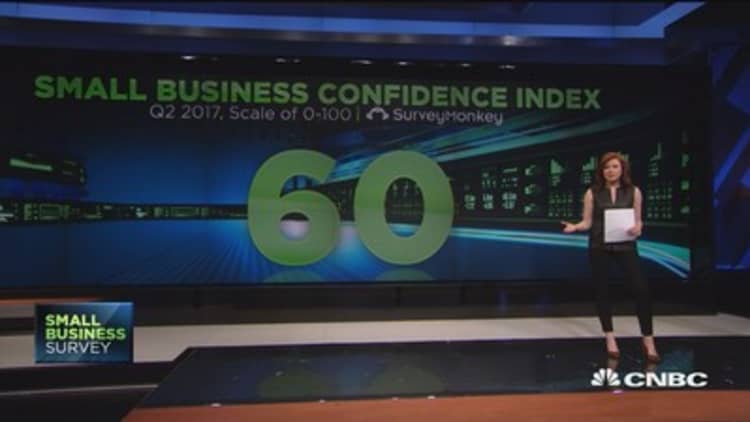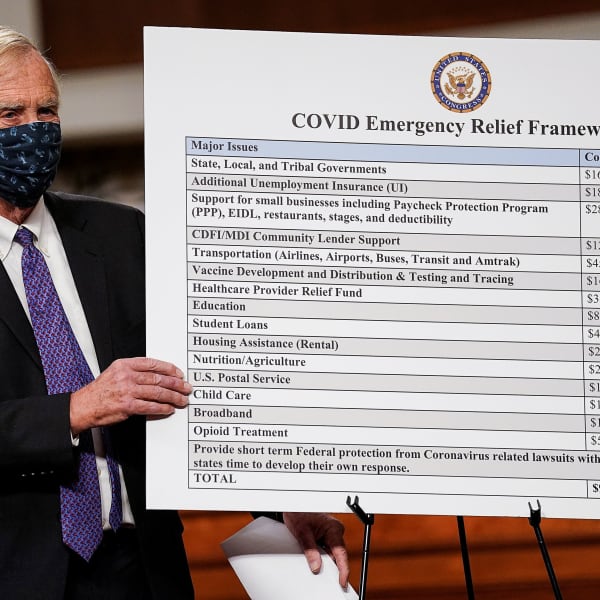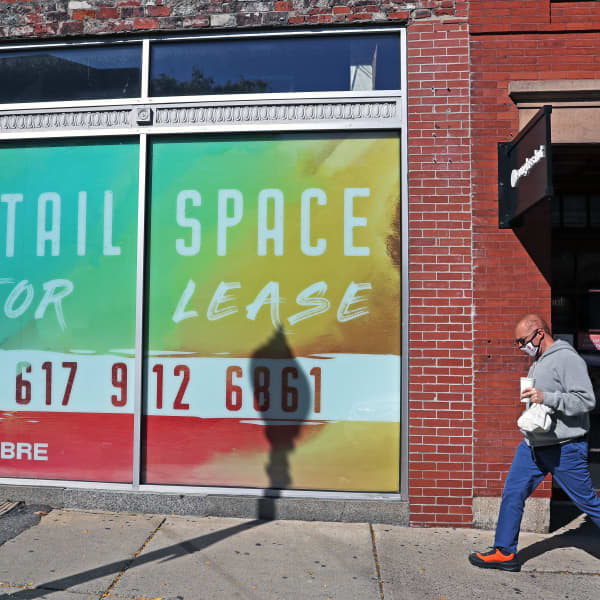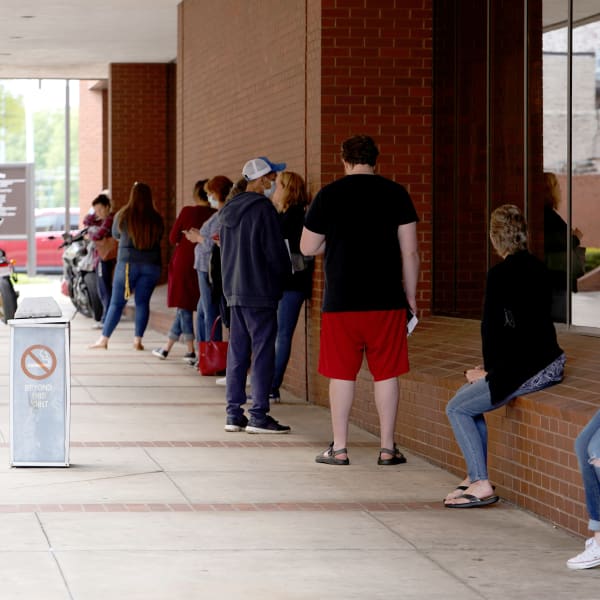
Taxes are the No. 1 concern of small-business owners, according to the first CNBC/SurveyMonkey Small Business Survey, released on Friday.
A quarter of small-business owners said that taxes are the most critical issue currently facing their businesses. That was followed by regulation, customer demand and cost of employee health care (each cited by 14 percent of respondents). The online poll was conducted April 17–28, 2017, among a national sample of 2,030 self-identified small-business owners ages 18 and up.
Among the respondents, 42 percent believe changes in tax policy will have a positive effect on their business, and 33 percent think it will have no effect. Just 24 percent believe it will have a negative effect.
So why are taxes such a big priority for entrepreneurs? "Taxes have a direct impact on the bottom line and growth and the ability to compete globally," says attorney Andrew Sherman, a partner at Seyfarth Shaw LLP who has advised many small-business clients. Some owners would like to invest more in the training and education they need to hold on to their talent in a tight job market but don't have enough left over after taxes, he adds.
Who are the winners from Trump's tax cut?
President Trump's tax reform proposal gave hope to small business owners that they would see some tax relief, though some say they view his brief document as the start of a negotiation, and not a plan that could actually pass in its current form.
"I think a lot of small business owners are patiently waiting and getting somewhat frustrated," says Sherman. "They really want to see pro-business regulatory reform and tax reform at the top of the agenda and are seeing everything but," he says.
Trump has called for a simpler tax code, with four brackets instead of seven, and would reduce tax rates but allow fewer deductions. He has also proposed reducing the tax rate paid by freelancers, sole proprietors, unincorporated small businesses and pass-through entities to 15 percent — the rate to which he also proposes reducing the corporate tax rate. Currently, these small businesses are taxed at much higher personal income-tax rates.
"If the Trump tax plan passes, what will be better for small business is there will be an option to leave more money in the business," says Raymond Haller, a tax partner at Grassi & Co., an accounting firm based in the New York City area. "It will be taxed at a lower rate. You can use that money to grow the business," he says.
Meanwhile, baby boomers who want to sell their businesses and retire are keeping an eye on Trump's proposal to lower capital gains rates for people in the two highest brackets in his plan. "If you're selling your business for $5 million or $10 million, that can make a big difference," says Sherman. Trump has also proposed eliminating the estate tax.
The small-business tax bite
Small-business owners are subject to the same tax-rate schedule as people with traditional jobs, note experts.
The difference is that they pay both the employer and employee's portion of the payroll tax to cover Social Security and Medicare. They pay 15.3 percent on the first $127,200 in net self-employment income and 2.9 percent on self-employment income that exceeds $127,200. For high earners, there is an extra 0.9 percent Medicare tax on the amount by which their annual income exceeds $200,000 for single filers, $250,000 for married couples filing jointly and $125,000 for married people filing separately.
"Self-employment taxes make the payroll tax much more visible in its full size to business owners than to salaried workers," according to Alan Cole, an economist with the Center for Federal Tax Policy at the Tax Foundation, an independent tax-policy research foundation.
And some business owners are still smarting from the expiration of the Bush tax cuts in 2013, which affected people in traditional jobs, too, according to Raymond J. Keating, chief economist of the Small Business & Entrepreneurship Council, an advocacy group. "We saw a deal cut where, in effect, taxes went up," he says.
That left them with less money to devote to growing their firms. "When you are talking about taxes — whether they be income taxes or an assortment of other taxes business pay — in the end, this is taking away not just the profits small-business owners can hopefully acquire but how much of their revenue they have left to reinvest the business, hire people and innovate," says Keating.
Main Street speaks out
Brett Anderson, who employs two full-time workers at his financial planning firm, St. Croix Advisors in Hudson, Wisconsin, says he really sees the magnitude of all of the money he pays adding up when filing his quarterly tax payments.
"I'm happy to pay my fair share, but I think our government has to be more efficient with the money it takes," says Anderson. "At the end of the day, you take a look at it and say, 'I'm writing out checks for a lot of money every quarter.'"
Kimberly Temple Schrandt and her husband own a small grocery store that employs 15 people in Harper, Kansas, about an hour south of Wichita. Kimberly also works full-time as a CPA at an accounting firm and as a financial coach at another business, Kansas Money Coach.
For 2016 the couple paid taxes close to $110,000 on a net revenue of approximately $350,000 at the store, more than 30 percent, by Schrandt's calculations. That figure includes income taxes, property tax and payroll tax but not sales tax. She calls it "an amazing amount, especially since we live in a state that does not tax flow-through business income."
[Small-business owners] live incredibly modest lives. The tax code, as it is now, strangles them year after year.Anthony Parentfounding partner of Parent and Parent LLP, a tax services attorney and CPA firm
Schrandt says she understands the government needs money to run but hopes it is well spent. "It is just sad to see hard-earned dollars go to waste when governments don't seem to care about how much hard work was put into the dollars they are receiving," she says.
David Waring, co-founder of FitSmallBusiness.com, a publishing company in New York City, takes a salary in the low six figures from the 35-employee business, which generates about $3.5 million in revenue. Once he pays his federal, state and city taxes, he says, it is hard to afford the 800-square-foot apartment where he and his wife, an occupational therapist, live with their two young children.
"On every dollar my wife and I earn over $86,000, we pay 52 cents in federal, state and city taxes," Waring says. "This also doesn't count the sales taxes that I pay every time I buy something, or the property tax that I will pay if I can ever earn enough to buy a house."
More from CNBC/SurveyMonkey Small Business Survey:
Why business owners love Trump but don't plan to create the jobs he wants
Small-business owners confident about economy and the future of their business
Waring says he understands the need to pay for government services. However, he adds, "If our tax rate were lower, my business partner and I would invest a lot more money back into our business," he says, adding that the primary way they would do that is by creating jobs. However, he believes Trump's plan, in its current form, would balloon the deficit because the government would get less revenue from business owners and because more people in W-2 jobs would try to convert to independent contractors to take advantage of the lower tax rate Trump has proposed.
"I think anybody who looks at that plan and thinks it is a good thing is just thinking about themselves and not thinking of what it will do to the economy as a whole," he says.
In the meantime, many business owners have little alternative than to spend a lot of time on tax planning.
"They live incredibly modest lives," says attorney Anthony Parent, founding partner of Parent and Parent LLP, a tax services attorney and CPA firm in New York City. "The tax code, as it is now, strangles them year after year."
— By Elaine Pofeldt, special to CNBC.com





